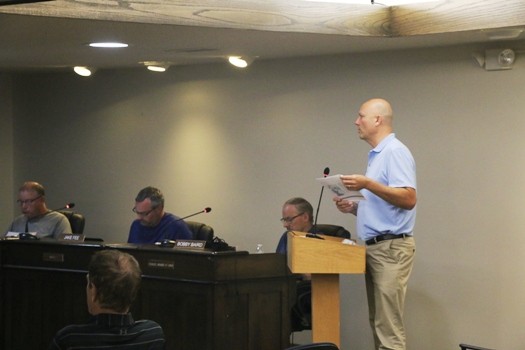The Crookston City Council on Monday night approved the policy regarding police-worn body cameras for the Crookston Police Department. No one spoke during a public hearing on the body cameras, and then the Council adopted the plans unanimously.
The Council had approved body cameras as part of the 2020 Police Department budget, and Police Lieutenant Darin Selzler said the department has been working on training the past few weeks with the company supplying the camera now that some COVID-19 restrictions have been lifted. “I think as of tonight, we’ll be done training all of our staff,” said Selzler. “The plan is to roll out the policy now that it has been approved. We’ll give our officers time to read it again, and the plan is to have them live on the street by this Thursday or Friday. We purchased the cameras earlier in the year, and the plan was to roll them out earlier in the year, but COVID set everything back. The company we purchased them from discontinued training until recently. That brings us fast forward to today and implementing the roll out this week.”
The body cameras, which run independently of the vehicle camera system, are always recording the last one minute of footage until a longer save recording is activated by an officer’s actions. Several triggers can start the saved recording said Selzler, including police enabling it themselves, removal of a rifle or other firearm from the vehicle, or the officers removing of firearms or taser from its holster. “They don’t make a body camera system that syncs into the car,” said Selzler. “There are several ways to turn them on. They will be automatically activated if you turn on your lights and sirens, if you remove a weapon from the vehicle, and if you draw your taser. They are always recording, so when they are turned on, they’ll catch the data a minute prior to that. They can be manually turned on or off. So, if you’re in a situation where that automatic activation didn’t take place, the officer can turn them on manually or turn them off manually if need be.”
Selzler said the policy allows the camera to be turned off only for non-evidentiary situations like a casual conversation. “The easiest way to sum that up is if the data doesn’t have any evidentiary value if it’s not a criminal arrest, or a traffic stop, or something like that, they’d be able to turn them off,” said Selzler. “Like if they were just going to have a casual encounter about the weather or giving directions to a citizen or something like that, they’d be able to turn them off. Otherwise, in the policy, they would not be able to turn them off, it says they must run the camera in that situation.”
 Marty Seifert from the Coalition of Greater Minnesota Cities spoke to the Council about the 2020 legislative session and special sessions. Seifert said there should be additional special sessions upcoming yet to tackle the bonding bill and other matters. Overall, Seifert said he thought the result of legislation has been positive for rural communities despite the challenges of 2020. “In particular for Crookston and the area of northwestern Minnesota the Local Government Aid payments being made on time and in full is a big deal,” said Seifert. “As we discussed with the City Council, the LGA is two-thirds of their budget. If LGA gets eroded, it means either a cut to city services like snow removal, police, or fire departments, or it means an increase in property taxes. So, that was a big deal and a big win for us. The CARES Act funding that came through from the federal government, Crookston, is a big beneficiary of that obviously. On the downside, we still need a bonding bill to get done. That is important for infrastructures like roads, bridges, sewers, and water projects. That’s the one major piece of legislation we still need to see get done.”
Marty Seifert from the Coalition of Greater Minnesota Cities spoke to the Council about the 2020 legislative session and special sessions. Seifert said there should be additional special sessions upcoming yet to tackle the bonding bill and other matters. Overall, Seifert said he thought the result of legislation has been positive for rural communities despite the challenges of 2020. “In particular for Crookston and the area of northwestern Minnesota the Local Government Aid payments being made on time and in full is a big deal,” said Seifert. “As we discussed with the City Council, the LGA is two-thirds of their budget. If LGA gets eroded, it means either a cut to city services like snow removal, police, or fire departments, or it means an increase in property taxes. So, that was a big deal and a big win for us. The CARES Act funding that came through from the federal government, Crookston, is a big beneficiary of that obviously. On the downside, we still need a bonding bill to get done. That is important for infrastructures like roads, bridges, sewers, and water projects. That’s the one major piece of legislation we still need to see get done.”
The bonding bill recently also fails to encompass the child care crisis as $20 million for child care facilities was removed from the bill. Several items were removed from the Council’s consent agenda including approval for sidewalks on Radisson Road, checks and disbursements, the purchase of wetland grants for the river access project at the Gentilly Bridge, and the acceptance of a grant from the State of Minnesota for an RV campground at Central Park.
CHECKS & DISBURSEMENTS
Councilman Bobby Baird removed the checks and disbursements to ask questions about the city purchasing hand sanitizer dispensers. Interim City Administrator Angel Weasner said they’d already bought the hand sanitizer but were unable to get enough dispensers for city facilities due to COVID-19 shortages initially. She added that when they got the opportunity, they purchased additional dispensers that will arrive Thursday.
Baird also asked Park and Recreation Director Scott Riopelle if the mower repairs that were being paid for were on the same mower that had been recently repaired. Riopelle said it was on the same mower, which has 1400 hours of use on it, and that he believes there had been an electrical issue that is now repaired. Baird said with budgets coming up, Parks and Recreation should look at a shorter replacement schedule, suggesting 3-4 years. The checks and disbursements then passed unanimously.
RADISSON ROAD
Councilman Steve Erickson said he’d received some question as to why the City Council was again voting on the Radisson Road sidewalks if it was a change order which didn’t need a council vote as they’d been told. He also said it was voted on last time regardless of the change order status, so why would it need to be approved again. Weasner, who wasn’t in attendance at the previous meeting, said the Council couldn’t bring an action vote up during the public forum, which they did at the last meeting, so to rectify that they had to have an official vote recorded on the agenda.
When the vote was called, Erickson changed his vote to no, but the sidewalk addition still passed 7-1. Erickson said the city needs to get a better plan and not have issues like this in the future. “When we were told it was a change order, that’s what it is and doesn’t have to go back to council,” said Erickson. “When I seen this on the agenda again, I thought maybe the people not agreeing with what we’re doing with the sidewalks could have a chance to come to explain their situations. I just think we have to get a better plan. I think we’ll work on that in the future and hopefully, not have any more issues like this.”
WETLAND CREDITS FOR GENTILLY BRIDGE RIVER ACCESS
Councilman Tom Vedbraaten questioned why the city was purchasing Wetland Credits from Red Lake County. Weasner explained that the project approval requires the city to buy some wetland credits as part of it’s $10,000 in matching funds to create the river access. “The Soil and Water Conservation District required us to have some Wetland Credits for the area that will be impacted when we do the access point at Gentilly Bridge,” said Weasner. “It was a two to one. We were impacting .04 acres and needed to purchase .08. We now have authority to purchase those credits from Red Lake County.”
Weasner said the city is purchasing the credits from Red Lake County because they needed wetland credits, and those were the closest publicly held credits. The purchase passed by a 7 to 1 vote with Vedbraaten voting nay. Vedbraaten said he’s been against the project from the start because he never sees anybody using that stretch of river. “I’ve always felt that going out to town to Gentilly is not a good use for our tax dollars,” said Vedbraaten. “It’s going to be an ongoing expense. Some say it’s not going to be much, but it’s still going to be an ongoing expense. We’re going to say cut the grass and have to go out there and still spending money out there. Some say the river is like a highway, but I’ve never seen a canoe out there. I’ve never seen one out there yet, so I think it’s a poor use of our taxpayer dollars.”
STATE GRANT FUNDS FOR CENTRAL PARK
The Council also discussed approving accepting funds from the State of Minnesota for upgrading the campground in Central Park. The upgrades would include additional RV campsites with power, including sewer and water hookups for all new and existing campsites, and a new bathhouse. Vedbraaten expressed he didn’t believe the Council had discussed if they were going to improve the campground in the park. The RV campground has been discussed several times by the Council, most recently at its strategic planning session in March.
Councilman Jake Fee also asked what the city’s match would be, and Weasner said the city would need to pay for the cost of the bathhouse because that wasn’t included in the grant funds, which would cover the city’s matching fee between $350,000-400,000. Councilman Bobby Baird asked why if the city match was $350,000-400,000, did the grant call for a required match of $580,989. Weasner said the project was a Red Lake River Corridor project so the remaining match dollars would be paid by the city’s partners East Grand Forks, Thief River Falls, Red Lake Falls, Fisher, and St. Hilaire.
The Council voted to accept the funds; however, the vote was 6-2 with Vedbraaten and Baird voting against the project. Baird said he feels it’s a waste of money. “I feel it’s a waste of money,” said Baird. “I look at eastside, and their occupancy is about half. I don’t know if that’s with the COVID or what. The Canadian dollar, we’re not getting any of that traffic. It floods, you have the major flood in the spring, and you probably have two to three floods in the summer. We used to have a lot of activities there and where are these activities going to move. There isn’t a great percentage of campers that use it now. I think we can do other things with that money instead of having a park that floods all the time. It’s going to a lot of money to keep that place upkeep and everything. How much is it going to cost? We don’t know that amount of a caretake and stuff, and what are the hours. There is a lot of questions, unanswered. I feel it’s a waste of taxpayer money right now.”
Baird added he believed the money would better be spent on fixing sidewalks downtown. “As I stated, this $450,000 plus we’re throwing at this, you know, they want people who canoe and stuff to come up and visit our businesses, well look at the sidewalks,” said Baird. “We could sure use that kind of money to fix the sidewalks to help our businesses in town. We’ve been fighting these sidewalks since I’ve been on the council and we can’t get it done. I think it’s a slap in the face to our businesses. City administration says it’s a $1 million to fix these sidewalks. With this money, we’re halfway there. That’s all I have to say.”
Councilman Joe Kresl voted in favor of accepting the funds and said even though there is some flooding bringing people into the middle of town is a great thing. “I think Central Park is a great thing,” said Kresl. “Even though there is some flooding and stuff that can’t be taken care of, I think the way they have it set up will make it easier to clear up after an event in the summer. I think bringing any people into the middle of downtown so they can walk around and use our downtown is always a great thing.”
Mayor Dale Stainbrook, who stated he for one access the river at the Gentilly Bridge reasonably often said he believes all the action regarding the river and adjacent property such as the campground is good for the community. “I think it’s going to increase activity on the river,” said Stainbrook. “It’s going to be more accessible, easier to get in for people. Myself, getting up there in age, I like easy access. I think it’s going to spur activity. I think it will help too, this $4,000 over two years to promote the river, bikes, and trails. I think once that whole pile gets together and people can go online to see what we have here, it’s going to not be just a regional thing. I think people from the metro are going to see what we have up here. We are going to have a great campground. I think it’s going to be used. I think it’s a win-win all the way around.”
Tags:


